Susquehanna County, Pennsylvania
| Susquehanna County, Pennsylvania | |
|---|---|
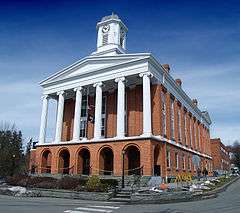 The Susquehanna County courthouse in Montrose | |
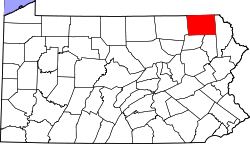 Location in the U.S. state of Pennsylvania | |
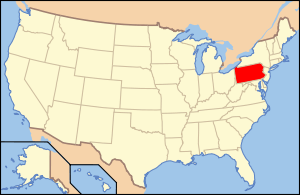 Pennsylvania's location in the U.S. | |
| Founded | October 13, 1812 |
| Named for | Susquehanna River |
| Seat | Montrose |
| Largest borough | Forest City |
| Area | |
| • Total | 832 sq mi (2,155 km2) |
| • Land | 823 sq mi (2,132 km2) |
| • Water | 8.7 sq mi (23 km2), 1.0% |
| Population (est.) | |
| • (2015) | 41,666 |
| • Density | 51/sq mi (20/km²) |
| Congressional district | 10th |
| Time zone | Eastern: UTC-5/-4 |
| Website |
www |
Susquehanna County is a county located in the U.S. state of Pennsylvania. As of the 2010 census, the population was 43,356.[1] Its county seat is Montrose.[2] The county was created on February 21, 1810, from part of Luzerne County[3] and later organized in 1812.[4] It is named for the Susquehanna River.
History
Settlement and conflict
The first settlers began to move into the area from Philadelphia and Connecticut in the mid 1700s. At the time, the area was part of Luzerne County. As more and more people from Connecticut moved in, there began to be some conflict. Under Connecticut's land grant, they owned everything from present day Connecticut to the Pacific Ocean. This meant their land grant overlapped with Pennsylvania's land grant. Soon fighting began. In the end, the Connecticut government was asked to surrender their claim on the area, which they did.
Formation
In 1810, Susquehanna County was formed out of Luzerne County and later in 1812, Montrose was made the county seat.
Civil War
Susquehanna County was one of the main stops on the Underground Railroad. Although this is not completely backed up by fact, there are many pointers saying this is true. These pointers say Montrose was the main hub. Here slaves would take refuge in the homes of citizens.
Coal and early prosperity
After the Civil War, coal started to be mined. Following this, railways and roads were built into the county allowing for more people to come. At one point the county had nearly 50,000 people. Coal became, as with neighboring counties, the back bone of the economy. This boom in coal would allow for an age of prosperity in the county.
Great Depression
When the Great Depression hit, the coal industry suffered horribly. Within months the coal industry was struggling. During World War II the coal industry picked up again, but only for a short time. Soon after the economy in the county failed. Between the 1950s and 1990s many mines were closed, railways were torn apart, and the economy took a turn for the worse. Unemployment rose and population decline increased.
Geography
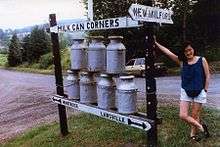
According to the U.S. Census Bureau, the county has a total area of 832 square miles (2,150 km2), of which 823 square miles (2,130 km2) is land and 8.7 square miles (23 km2) (1.0%) is water.[5]
Susquehanna County is very mountainous, with large concentrations of mountains in the east and smaller, more hill-like mountains in the west. The highest mountain in the county is North Knob just west of Union Dale. Most people live in one of the several long and mostly narrow valleys. These valleys are good farming land.
Adjacent counties
- Broome County, New York (north)
- Wayne County (east)
- Lackawanna County (southeast)
- Wyoming County (southwest)
- Bradford County (west)
- Tioga County, New York (northwest)
Demographics
| Historical population | |||
|---|---|---|---|
| Census | Pop. | %± | |
| 1820 | 9,960 | — | |
| 1830 | 16,787 | 68.5% | |
| 1840 | 21,195 | 26.3% | |
| 1850 | 28,688 | 35.4% | |
| 1860 | 36,267 | 26.4% | |
| 1870 | 37,523 | 3.5% | |
| 1880 | 40,354 | 7.5% | |
| 1890 | 40,093 | −0.6% | |
| 1900 | 40,043 | −0.1% | |
| 1910 | 37,746 | −5.7% | |
| 1920 | 34,763 | −7.9% | |
| 1930 | 33,806 | −2.8% | |
| 1940 | 33,893 | 0.3% | |
| 1950 | 31,970 | −5.7% | |
| 1960 | 33,137 | 3.7% | |
| 1970 | 34,344 | 3.6% | |
| 1980 | 37,876 | 10.3% | |
| 1990 | 40,380 | 6.6% | |
| 2000 | 42,238 | 4.6% | |
| 2010 | 43,356 | 2.6% | |
| Est. 2015 | 41,666 | [6] | −3.9% |
| U.S. Decennial Census[7] 1790-1960[8] 1900-1990[9] 1990-2000[10] 2010-2013[1] | |||
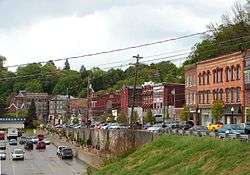
As of the census[11] of 2000, there were 42,238 people, 16,529 households, and 11,785 families residing in the county. The population density was 51 people per square mile (20/km²). There were 21,829 housing units at an average density of 26 per square mile (10/km²). The racial makeup of the county was 98.54% White, 0.30% Black or African American, 0.15% Native American, 0.22% Asian, 0.01% Pacific Islander, 0.17% from other races, and 0.60% from two or more races. 0.67% of the population were Hispanic or Latino of any race. 26% were of English, 16.1% were of German, 15.1% Irish, 8.6% Italian and 7.7% Polish ancestry according to the 2012 American Community Survey.
There were 16,529 households out of which 31.90% had children under the age of 18 living with them, 57.70% were married couples living together, 8.60% had a female householder with no husband present, and 28.70% were non-families. 24.30% of all households were made up of individuals and 11.50% had someone living alone who was 65 years of age or older. The average household size was 2.53 and the average family size was 2.99.
- Birth rate
In the county, the population was spread out with 25.50% under the age of 18, 6.70% from 18 to 24, 27.10% from 25 to 44, 25.20% from 45 to 64, and 15.50% who were 65 years of age or older. The median age was 40 years. For every 100 females there were 98.90 males. For every 100 females age 18 and over, there were 95.80 males. Susquehanna County's live birth rate was 612 births in 1990. The County's live birth rate in 2000 was 499 births, while in 2011 it had declined to 374 babies.[12]
- Teen Pregnancy rate
Susquehanna County had a 318 babies born to teens (age15-19) in 2011. In 2015, the number of teen births in Susquehanna County was 265.[13]
- County poverty demographics
According to research by The Center for Rural Pennsylvania, which is a legislative agency of the Pennsylvania General Assembly, the poverty rate for Susquehanna County was 12.8% in 2014.[14] The statewide poverty rate was 13.6% in 2014. The 2012 childhood poverty rate by school district was: Blue Ridge School District - 42.9% living at 185% or below than the Federal Poverty Level; Montrose Area School District - 32%; Elk Lake School District - 45.3%; Forest City Regional School District - 53.7%; Mountain View School District - 48.8% and Susquehanna Community School District - 55.8%.[15]
Politics
As of November 3, 2015, there are 24,854 registered voters in Susquehanna County.
- Republican: 15,501 (53.85%)
- Democratic: 10,063 (34.96%)
- Other Parties: 3,224 (11.20%)
County Commissioners
- MaryAnn Warren, Democrat (January 2004 to current)
- Alan M. Hall, Vice-Chair, Republican (January 2012 to current)
- Elizabeth M. Arnold, Chair, Republican (January 2016)
Row Offices
- Clerk of Courts and Prothonotary, Susan Eddleston, Republican
- Coroner, Tony Conarton, Republican
- District Attorney, Robert Klein, Republican
- Recorder of Deeds and Register of Wills, Michelle Estabrook, Republican
- Sheriff, Lance Benedict, Republican
- Treasurer, Jason Miller, Republican
- Auditor, George Starzec, Republican
- Auditor, Susan Jennings, Democrat
State Representatives
- Tina Pickett, Republican (110th district) - Apolacon, Auburn, Dimock, Forest Lake, Jessup, Middletown, and Rush Townships, and Little Meadows Borough
- Sandra Major, Republican (111th district) - Ararat, Bridgewater, Brooklyn, Choconut, Clifford, Franklin, Gibson, Great Bend, Harford, Harmony, Herrick, Jackson, Lathrop, Lenox, Liberty, New Milford, Oakland, Silver Lake, Springville, and Thompson Townships, and Friendsville, Great Bend, Hallstead, Hop Bottom, Lanesboro, Montrose, New Milford, Oakland, Susquehanna Depot, Thompson, and Union Dale Boroughs
State Senators
- Lisa Baker, Republican (20th district) - Ararat, Auburn, Brooklyn, Clifford, Gibson, Great Bend, Harford, Harmony, Herrick, Jackson, Lathrop, Lenox, New Milford, Oakland, Springville, and Thompson Townships, and Forest City, Great Bend, Hallstead, Hop Bottom, Lanesboro, New Milford, Oakland, Susquehanna Depot, Thompson, and Union Dale Boroughs
- Gene Yaw, Republican (23rd district) - Apolacon, Bridgewater, Choconut, Dimock, Forest Lake, Franklin, Jessup, Liberty, Middletown, Rush and Silver Lake Townships, and Friendsville, Little Meadows, and Montrose Boroughs
US Representative
- Tom Marino, Republican (PA-10)
Economy
The economy in the county is mainly made up of: retail, health care industry, public school employment, small businesses, and government officials.[17]
Major employers
- 2015
Listed in order of number of employees. According to the Pennsylvania Department of Labor and Industry 2015 monthly report:[18]
- Barnes-Kasson County Hospital
- Montrose Area School District
- Endless Mountains Health Systems
- C & G Construction Inc
- Elk Lake School District
- Susquehanna County government
- Mountain View School District
- Pennsylvania State Government
- Gassearch Drilling Services Corp
- Blue Ridge School District
- 2014[19]
- Montrose Area School District
- Barnes-Kasson County Hospital
- Gassearch Drilling Services Corp
- Endless Mountains Health Systems
- Elk Lake School District
- Blue Ridge School District
- Susquehanna County government
- Mountain View School District
- Elk Mountain Ski Resort INC
- Forest City Regional School District
Natural gas
Ever since drilling began for natural gas, the economy has improved. With more jobs the unemployment rate has gone down and the population decline has steadied out. Natural gas has brought a new and reliable industry to the county. With these new workers, small businesses have also prospered. There were 1,079 active natural gas wells in the county in 2011.[20]
Tourism
Susquehanna County's natural beauty, great skiing, and quaint villages make it an ever-growing tourist destination.
Education
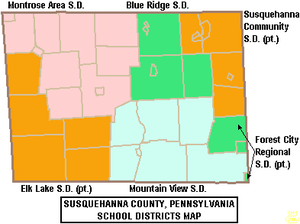
Public libraries
- Susquehanna County Historical Society & Free Library Association
- Pratt Memorial Library
- Forest City Library
- Hallstead Public Library
- Hallstead-Great Bend Library
- Susquehanna Free Library
Public school districts
- Blue Ridge School District (New Milford)
- Elk Lake School District (Dimock) (also in Wyoming County)
- Forest City Regional School District (Forest City) (also in Lackawanna and Wayne Counties)
- Montrose Area School District (Montrose)
- Mountain View School District (Kingsley)
- Susquehanna Community School District (also in Wayne County)
Vocational schools
- Susquehanna County Career and Technology Center (Dimock Township)
Intermediate unit
- Luzerne Intermediate Unit 18
Northeast Intermediate Unit 19 (NEIU 19)
Private schools
- Faith Mountain Christian Academy (New Milford)
Transportation
Major Highways
Rail
Susquehanna County's last mainstream passenger train services ended in the late 1970s. Since then mainly freight trains have used the lines.
Air
Although Susquehanna County boasts several airstrips, they are strictly recreational. The closest main airports are in Binghamton, New York and Scranton, Pennsylvania.
Recreation
There is one Pennsylvania state park in Susquehanna County:
- Salt Springs State Park is 7 miles (11 km) north of Montrose, just off Pennsylvania Route 29.
Susquehanna County is located in the Endless Mountains of northeastern Pennsylvania. Susquehanna County is rural in nature. In 2010, it ranked 54th out of 67 Pennsylvania counties for population density per square mile at 52.7 people per square mile.[21]
Communities
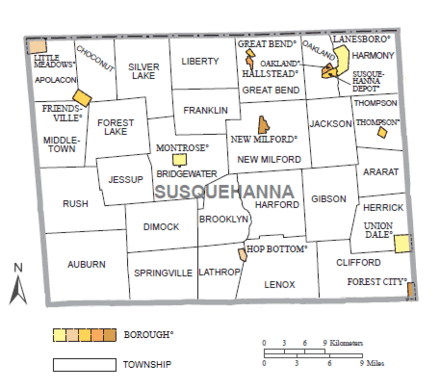
Under Pennsylvania law, there are four types of incorporated municipalities: cities, boroughs, townships, and, in at most two cases, towns. The following boroughs and townships are located in Susquehanna County:
Boroughs
Townships
Population ranking
The population ranking of boroughs in the following table is based on the 2010 census of Susquehanna County.[22]
† county seat
| Rank | City/Town/etc. | Municipal type | Population (2010 Census)
|
|---|---|---|---|
| 1 | Forest City | Borough | 1,911 |
| 2 | Susquehanna Depot | Borough | 1,643 |
| 3 | † Montrose | Borough | 1,617 |
| 4 | Hallstead | Borough | 1,303 |
| 5 | New Milford | Borough | 868 |
| 6 | Great Bend | Borough | 734 |
| 7 | Oakland | Borough | 616 |
| 8 | Lanesboro | Borough | 506 |
| 9 | Hop Bottom | Borough | 337 |
| 10 | Thompson | Borough | 299 |
| 11 | Little Meadows | Borough | 273 |
| 12 | Union Dale | Borough | 267 |
| 13 | Friendsville | Borough | 111 |
See also
- National Register of Historic Places listings in Susquehanna County, Pennsylvania
- Woodbourne Forest and Wildlife Preserve
References
- 1 2 "State & County QuickFacts". United States Census Bureau. Retrieved November 22, 2013.
- ↑ "Find a County". National Association of Counties. Retrieved 2011-06-07.
- ↑ "Township Incorporations, 1790 to 1853". Susquehanna County Historical Society. Retrieved 9 March 2013.
- ↑ "Pennsylvania: Individual County Chronologies". Pennsylvania Atlas of Historical County Boundaries. The Newberry Library. 2008. Retrieved March 13, 2015.
- ↑ "2010 Census Gazetteer Files". United States Census Bureau. August 22, 2012. Retrieved March 10, 2015.
- ↑ "County Totals Dataset: Population, Population Change and Estimated Components of Population Change: April 1, 2010 to July 1, 2015". Retrieved July 2, 2016.
- ↑ "U.S. Decennial Census". United States Census Bureau. Retrieved March 10, 2015.
- ↑ "Historical Census Browser". University of Virginia Library. Retrieved March 10, 2015.
- ↑ Forstall, Richard L., ed. (March 24, 1995). "Population of Counties by Decennial Census: 1900 to 1990". United States Census Bureau. Retrieved March 10, 2015.
- ↑ "Census 2000 PHC-T-4. Ranking Tables for Counties: 1990 and 2000" (PDF). United States Census Bureau. April 2, 2001. Retrieved March 10, 2015.
- ↑ "American FactFinder". United States Census Bureau. Retrieved 2011-05-14.
- ↑ Pennsylvania Department of Health, Birth Age County Reports 1990 and 2011, 2011
- ↑ Robert Wood Johnson Foundation, (2016). "Pennsylvania Teen Births 2015,".
- ↑ US Census Bureau (2015). "Poverty Rates by County Small Area Income and Poverty Estimates".
- ↑ Pennsylvania Budget and Policy Center (2012). "Student Poverty Concentration 2012".
- ↑ http://susqco.com/county-government/county-commissioners/
- ↑ Pennsylvania Department of Community and Economic Development (2015). "Susquehanna County Profile".
- ↑ Pennsylvania Department of Labor and Industry (April 2016). "Susquehanna County Profile" (PDF).
- ↑ PA Department of Labor and Industries - Center for Workforce Information & Analysis, Susquehanna County Profile 2014, October 2015
- ↑ NPR State Impact (2015). "Shale Play Susquehanna County Natural Gas Wells Map showing active wells and violations".
- ↑ U.S. Census Bureau (2010). "Pennsylvania Population per square mile, 2010 by County".
- ↑ http://www.census.gov/2010census/
External links
| Wikimedia Commons has media related to Susquehanna County, Pennsylvania. |
 |
Tioga County, New York | Broome County, New York |  | |
| Bradford County | |
Wayne County | ||
| ||||
| | ||||
| Wyoming County | Lackawanna County |
Coordinates: 41°49′N 75°48′W / 41.82°N 75.80°W